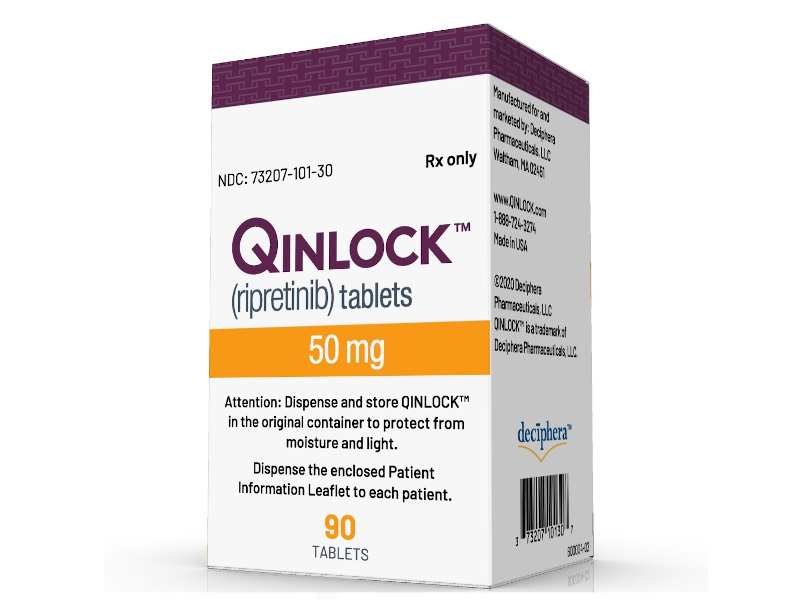Keytruda (pembrolizumab) vs Qinlock (ripretinib)
Keytruda (pembrolizumab) vs Qinlock (ripretinib)
Keytruda (pembrolizumab) is an immune checkpoint inhibitor that works by blocking the PD-1 pathway, which helps the immune system to detect and fight cancer cells, and is commonly used for various types of cancers, including melanoma, lung cancer, and head and neck cancer. Qinlock (ripretinib) is a kinase inhibitor designed to treat advanced gastrointestinal stromal tumors (GIST) by inhibiting a range of kinases that drive the disease. The choice between Keytruda and Qinlock would depend on the specific type of cancer a patient has, as they are used to treat different conditions and operate through different mechanisms of action.
Difference between Keytruda and Qinlock
| Metric | Keytruda (pembrolizumab) | Qinlock (ripretinib) |
|---|---|---|
| Generic name | Pembrolizumab | Ripretinib |
| Indications | Various types of cancers including melanoma, lung cancer, head and neck cancer, Hodgkin lymphoma, and others | Advanced gastrointestinal stromal tumor (GIST) in adult patients who have received prior treatment with 3 or more kinase inhibitors, including imatinib |
| Mechanism of action | Programmed death receptor-1 (PD-1) blocking antibody | Switch pocket kinase inhibitor targeting KIT and PDGFRA mutations |
| Brand names | Keytruda | Qinlock |
| Administrative route | Injection (IV) | Oral |
| Side effects | Fatigue, musculoskeletal pain, decreased appetite, pruritus, diarrhea, nausea, rash, pyrexia, cough, dyspnea, constipation, pain in extremity, and headache | Alopecia, fatigue, nausea, abdominal pain, constipation, myalgia, diarrhea, decreased appetite, palmar-plantar erythrodysesthesia syndrome, and vomiting |
| Contraindications | Patients with severe hypersensitivity to pembrolizumab or any of its excipients | Patients with severe hypersensitivity to ripretinib or any of its excipients |
| Drug class | Anti-PD-1 monoclonal antibody | Tyrosine kinase inhibitor |
| Manufacturer | Merck & Co. | Deciphera Pharmaceuticals |
Efficacy
Keytruda (Pembrolizumab) Efficacy in Gastric Cancer
Keytruda, also known by its generic name pembrolizumab, is a monoclonal antibody that has been shown to be effective in the treatment of certain types of gastric cancer. It works by inhibiting the programmed death receptor-1 (PD-1) pathway, which is a mechanism that cancer cells can exploit to evade the immune system. By blocking this pathway, Keytruda can help the immune system to recognize and fight cancer cells. The efficacy of Keytruda in gastric cancer has been evaluated in several clinical trials, where it has been used as a monotherapy or in combination with other treatments.
One of the pivotal studies for Keytruda's approval in gastric cancer was the KEYNOTE-059 trial. In this study, patients with advanced gastric or gastroesophageal junction cancer who had previously received two or more lines of therapy were treated with pembrolizumab. The results demonstrated a meaningful objective response rate, with some patients experiencing significant tumor shrinkage. The duration of response varied, with some patients maintaining response for a prolonged period. However, it is important to note that not all patients respond to Keytruda, and the efficacy can be influenced by factors such as the expression level of PD-L1 in the tumor.
Qinlock (Ripretinib) Efficacy in Gastric Cancer
Qinlock, known generically as ripretinib, is a kinase inhibitor that targets a range of tyrosine kinases, including KIT and PDGFRα, which are known to be involved in the growth of gastrointestinal stromal tumors (GIST). While ripretinib has been approved for the treatment of advanced GIST, its use specifically in gastric cancer is less established. The efficacy of Qinlock in gastric cancer would likely be related to the presence of GIST, which can occur in the stomach. However, the use of ripretinib in typical adenocarcinoma of the stomach (the most common type of gastric cancer) has not been a primary focus of clinical trials, and thus its efficacy in this context is not well-documented.
For patients with GIST, Qinlock has been studied in the INVICTUS trial, which included patients with advanced GIST who had previously received treatment with other tyrosine kinase inhibitors. Ripretinib demonstrated a significant improvement in progression-free survival compared to placebo, and it also showed an overall survival benefit, although the data was not mature at the time of the initial analysis. While these results are promising for patients with GIST, it is crucial to differentiate between GIST and other forms of gastric cancer when considering the efficacy of Qinlock, as its approval and established efficacy are specific to GIST and not gastric cancer in general.
Regulatory Agency Approvals
Keytruda
-
European Medical Agency (EMA), European Union

-
Food and Drug Administration (FDA), USA

-
Health Canada

-
Therapeutic Goods Administration (TGA), Australia

-
Medsafe (NZ)

Qinlock
-
European Medical Agency (EMA), European Union

-
Food and Drug Administration (FDA), USA

-
Health Canada

-
Therapeutic Goods Administration (TGA), Australia

Access Keytruda or Qinlock today
If Keytruda or Qinlock are not approved or available in your country (e.g. due to supply issues), you can access them via Everyone.org.
How it works

Make an enquiry
Choose the medicine you want to buy, answer a couple of questions, and upload your prescription to speed things up. We’ll get back to you within 24 hours.


Make an enquiry
Choose the medicine you want to buy, answer a couple of questions, and upload your prescription to speed things up. We’ll get back to you within 24 hours.


Breeze through the paperwork
We'll guide you through the required documents for importing unapproved medicine, ensuring you have all the necessary information.


Get a personalized quote
We’ll prepare a quote for you, including medicine costs and any shipping, administrative, or import fees that may apply.


Receive your medicine
Accept the quote and we’ll handle the rest - sourcing and safely delivering your medicine.

Some text on this page has been automatically generated. Speak to your physician before you start a new treatment or medication.
Let's talk
If you have any questions, call us or send us a message through WhatsApp or email:
Contact us




